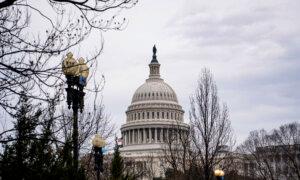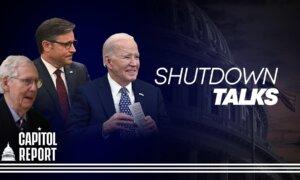The bill would be the fourth continuing resolution of this fiscal year, angering some Republicans who believe more should be done to curb government spending.
The U.S. House of Representatives is expected to pass continuing spending legislation to avert a partial shutdown of the federal government for the fourth time in five months, following an agreement reached by congressional leaders late on Feb. 28.
The reprieve will be temporary, extending funding for some government departments only through March 8 and others through March 22.
Six spending bills are covered under the agreement. Four of the six are set to expire on March 1.
The deal was announced in a joint statement issued by House Speaker Mike Johnson (R-La.), Senate Majority Leader Chuck Schumer (D-N.Y.), House Minority Leader Hakeem Jeffries (D-N.Y.), Senate Minority Leader Mitch McConnell (R-Ky.), and leaders of the appropriations committees for both the House and Senate.
“We are in agreement that Congress must work in a bipartisan manner to fund our government,” the Feb. 28 statement began. The agreement sets the parameters for bills funding the Food and Drug Administration and the Department of Agriculture, as well as Commerce, Justice, Science, Energy and Water Development, Interior, Military Construction, the Veterans Administration, and Transportation, Housing, and Urban Development.
According to the agreement, those bills will be passed into law by March 8 and will stay within the discretionary spending limits agreed to in June through the Fiscal Responsibility Act (FRA) and January’s topline spending agreement.
The FRA was negotiated by then-Speaker Kevin McCarthy and President Joe Biden. Fiscal hawks objected to the bill because it went beyond the limits passed by House Republicans in the Limit, Save, Grow Act in April of 2023.
The agreement calls for the remaining spending bills to be passed by March 22. Those bills cover spending for the Departments of Defense; Financial Services and Government Administration; Legislative Branch; and State and Foreign Operations.
The bill extends Fiscal Year 2023 spending levels, which expired on Sept. 30, to cover this roughly three-week period.
Mr. McCarthy was ousted from his role in part due to engineering the passage of a 45-day continuing spending resolution (CR) on Sept. 30. Mr. Johnson presided over the passage of a “laddered” CR in October, with staged expiration dates on Jan. 19 and Feb. 2.
‘Domestic Spying’
Sen. Mike Lee (R-Utah) reacted to the proposed deal on social media, criticizing its temporary reauthorization of Section 702 of the Foreign Intelligence and Surveillance Act. “Under the new government funding plan pushed by The Firm, unconstitutional domestic spying on American citizens will continue undisturbed. No matter how little you trust Washington, it’s too much,” Mr. Lee wrote on X (formerly Twitter) on Feb. 28.
Rep. Bob Good (R-Va.) repeated a call to pass a full-year CR that would include automatic spending cuts as an alternative to the deal proposed by congressional leaders.
The four top congressional leaders, Messrs. Johnson, Schumer, Jeffries, and McConnell, met with President Biden on Feb. 27 to discuss the nation’s budget. Mr. Schumer later described the meeting as tense but productive.
Border Crisis
Mr. Johnson emerged from the conference calling it “frank and honest.” He added that he had reiterated the position of House Republicans that America’s needs must come before continued spending on Ukraine, pointing to the immigration crisis at the southern border. He also said he was “very optimistic” about preventing a government shutdown.
Mr. Johnson defended the deal in a press conference ahead of the scheduled vote by saying it was both necessary and a positive step in reforming the federal budgeting process.
“Our first responsibility is to fund the government,” Mr. Johnson said, adding that to secure the border is Congress’s second task.
Mr. Johnson said this year’s budgeting effort represented progress over the opaque process that has become routine in Washington.
“We’ve instituted some new innovations. We broke the omnibus fever,” he said, referring to Congress’ penchant for passing large, catchall spending bills just as funding is set to expire.
The speaker insisted that members have had more say in the budgeting process this year as bills worked their way through committees, and would have 72 hours to review the final text of the remaining spending bills before voting.
Original News Source Link – Epoch Times
Running For Office? Conservative Campaign Consulting – Election Day Strategies!


